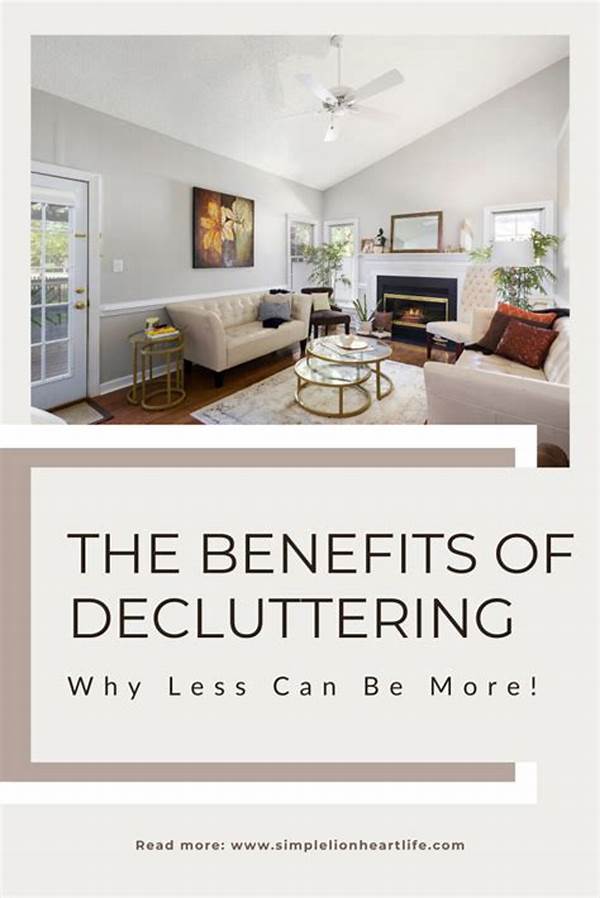Declutter and Focus: Why Less Is More
Read More : Digital Declutter List
In a world crowded with choices, tasks, and possessions, it’s easy to feel overwhelmed. Enter the concept of decluttering. At its core, decluttering isn’t just about cleaning your physical space—it’s about clearing your mental one too. The phrase “declutter and focus: why less is more” captures a fundamental truth: simplifying your environment and mind can lead to increased focus, productivity, and happiness. Imagine being able to locate everything you need promptly, feeling less stressed, and ultimately being more present in daily life. Doesn’t that sound appealing? Let’s delve into why embracing less can indeed give you more.
There’s an undeniable charm in simplicity and minimalism—a philosophy championed by many successful figures in various fields. When we buy or collect more things, thinking they will add meaning, they eventually create more chaos. This clutter isn’t restricted to physical items alone; overcommitting our time and energy can result in mental clutter that impacts our effectiveness and emotional well-being. Declutter and focus: why less is more reinforces the idea that reducing distractions can lead to an enhanced focus, allowing you to channel your energies into what truly matters. Imagine the liberation when you no longer spend countless minutes sifting through clutter to find essentials, or when you no longer have a calendar packed with unnecessary engagements.
There is a growing body of research that supports the benefits of decluttering. According to studies, a clutter-free environment can reduce stress and anxiety. But beyond the psychological benefits, decluttering can also have social advantages; you are more likely to invite friends over if your space is organized. This process of letting go and simplifying also teaches us to value experiences over possessions, focusing on building memories and relationships rather than accumulating unnecessary items. So, why not take that step today? Declutter and focus: why less is more—isn’t just a slogan—it’s a lifestyle change that promises a richer, more intentional life.
Simplify Your Mind and Space
Now that we’ve explored the “why,” it’s time to consider how you can declutter and embrace a life with focus. Begin by setting small, achievable goals. Maybe it’s your work desk, your wardrobe, or even your digital space—pick one area to organize each week. Remember, the goal isn’t perfection but progression. Celebrate every small victory; each item you donate or toss is a step toward clarity. This journey is personal, and while advice and strategies abound, tailoring them to fit your life and pace is essential.
—Description: Embracing Simplicity for Optimal Focus
The act of decluttering extends beyond merely rearranging furniture or emptying out a drawer. It’s a comprehensive approach to life. When we talk about declutter and focus: why less is more, we’re focusing on a paradigm shift—a revolutionary way to experience and interact with our surroundings. Picture a workspace free from stacks of paper, a home that’s easy to clean, or even a mind unburdened by nagging tasks. Such environments foster creativity and are conducive for the mind to focus on potential breakthroughs. This perspective isn’t just refreshing; it’s necessary in a fast-paced world.
Statistics show that physical clutter can significantly affect our mood and mental health. People with organized spaces are more likely to feel calm, focused, and even confident. Aside from anecdotal evidence, research backs these claims. A study published by Princeton University Neuroscience Institute found that physical clutter competes for your attention, reducing performance and increasing stress. Thus, the journey toward decluttering becomes not only a personal improvement strategy but also an investment in mental health. Why endure chaos when simplicity can be life-changing?
The Minimalist Advantage
Embracing minimalism isn’t about giving up everything you love. On the contrary, it’s about appreciating the things you have, reducing materialistic dependencies, and valuing non-tangible aspects of life like love, laughter, and experiences. Declutter and focus: why less is more encourages us to evaluate life’s true priorities. By focusing on less, we expand our capacity to enjoy and engage with our environments, relationships, and personal goals.
When we give up excess, we create room for what truly matters. This is the core message of decluttering: fostering a focus that brings clarity and contentment. Picture the freedom from choice paralysis when your wardrobe has fewer yet beloved items, or the calm when your computer’s desktop isn’t littered with countless icons. The minimalist lifestyle teaches us about intentionality and the importance of aligning our external environments with our internal aspirations—resulting in a harmonious balance that promotes bliss and achievement.
The Road to a Focused Lifestyle
Finding motivation to declutter and focus on why less is more can be challenging in the beginning. Habits are hard to break, especially when it comes to behaviors or attachments we’ve had for years. However, remember that motivation comes not only from looking at what you’re letting go of but what you’re gaining: space, time, and mental peace. Begin today—remove one item, decline one unrelated task. As you clear the unnecessary, you gain insight and time that align with what brings joy and fulfillment.
—Actions To Take for Decluttering and Gaining Focus
—Introduction to the Efficiency of Less
There’s a unique beauty in having just enough—a sentiment echoed by the philosophy of decluttering and focusing on why less is more. Imagine opening your closet and finding an outfit thoughtfully selected, or walking into a room that breathes with space and tranquility. The beauty of less lies not in deprivation but in choice, and the freedom it brings. Clutter and chaos tend to seep into our minds, leaving us scattered and unfocused. However, with less, comes an ability to focus, channeling energy to what truly resonates with our values.
The digital age, with its endless options, brings another layer to this discussion. Here, decluttering doesn’t only pertain to physical items; our digital lives become just as pivotal in ensuring clarity and focus. An overwhelming email inbox or a phone littered with unchecked notifications can become a mental burden akin to a cluttered room. This calls for a systematic approach in tackling not only physical but digital clutter, underscoring a digital minimalism viewpoint that embraces technology while curbing excess.
Within this minimalist sphere, adopting a lifestyle where less is more isn’t confined to impulse purchases or trend-following. It’s about declutter and focus: why less is more—a commitment to a life uncluttered by needless distractions and enriched by endeavors that matter. It’s a practice analogous to gardening; by weeding out the unnecessary, what remains blooms more vividly and beautifully. Welcome to a new way of living where freedom and focus are front and center, promising a richer quality of life.
Creating a Lifestyle of Intention
The path of decluttering may seem daunting, yet the rewards far outweigh the initial challenges. It boils down to making conscious choices—deciding what truly adds value and joy. More than a mere trend, it calls for introspection; evaluating why you own certain items or why particular activities are prioritized can catalyze meaningful change. Embracing a decluttered life isn’t merely an external transformation but an internal shift, redefining how we perceive success and fulfillment.
—8 Tips for Effective Decluttering and Focusing
—Navigating the Benefits of a Focused Life
A decluttered, focused lifestyle yields profound rewards, such as increased mental clarity and enriched relationships. When clutter is eradicated, the surplus mental space often translates into more creativity and problem-solving capacity. Imagine the time saved every day from not having to search for misplaced items, or the peace of mind gained from an organized environment. Declutter and focus: why less is more echoes because it aligns with our intrinsic desire for simplicity in the midst of complexity.
Moreover, as physical clutter diminishes, so too does the mental and emotional burden. Decluttered, organized spaces offer a sanctuary that not only fosters productivity but also nurtures well-being. A life uncluttered provides breathing space, an often-overlooked luxury in our fast-paced world. It’s this breathing space that cultivates deeper connections, whether with ourselves, our loved ones, or our work. Ultimately, the art of decluttering reveals that less truly is more, leading to a balanced, harmonious existence rooted in intentional living, where what matters most takes center stage.


